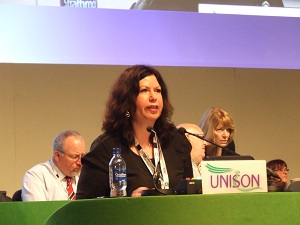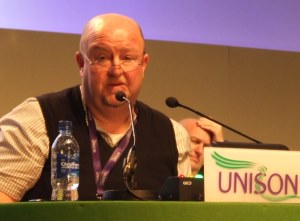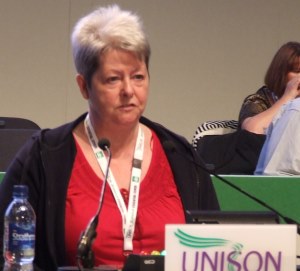 |
Jane Aitchison |
 |
Sam Maccartney |
 |
Mary Sampson |
The international session heard harrowing testimony
of Colombian activists and calls for a sporting boycott
to end Israeli apartheid.
Moving testimony of Colombian activists inspires support
Colombia is still one of the most dangerous places
in the world to be a trade unionist and conference pledged
to continue UNISON’s long term support for working
people in Colombia in their struggles for human and
trade union rights and to build a better quality of
life.
Speaker after speaker gave examples of the human cost
of government policies in Colombia, with trade unionists
killed, massive internal displacement and a lack of
justice.
Mary Sampson from Lanarkshire Health told delegates
that the numbers of trade unionists killed in Colombia
in 2008 were equal in number to everyone in the conference
hall – a shocking statistic which has got even
worse since then.
Her branch were privileged to welcome “our Colombian
sister, Alfamia Castillo, who gave us an inspiring speech
on the work she and her colleagues undertake in constant
fear of their lives.”
Mary called for UNISON to actively encourage regions
and branches to support campaigns that build a sustainable
infrastructure supporting community organising, protecting
workers and their families, “for the safety of
workers like Alfamia, to allow them to support working
people in Colombia.”
Jane Aitchison’s South Lanarkshire Branch also
took the opportunity to organise a skype session with
Berenice Celeyta Alayon, a leading human rights campaigner
in Colombia.
Jane told conference, “It was inspiring to hear
Berenice describe the bravery of trade unionists who
are rising up and organising in spite of Colombia being
the most dangerous place in the world to be a trade
unionist.
“It was inspiring to hear of this bravery from
someone who herself puts herself in danger for championing
human rights in her own country and beyond.
“All Berenice wants is for her people to be able
to live in peace, with access to a decent health service
and education. Is that really too much to ask?”
asked Jane.
“Thanks to international solidarity there have
been some successes but there is still a very long way
to go.”
Call for a sporting boycott to end Israeli apartheid
Conference reaffirmed UNISON’s support for a
Palestinian State and pledged to continue its campaign
for boycott, divestment and sanctions (BDS) against
Israel.
In a passionate speech Glasgow City’s Sam Macartney,
Chair of Scotland’s International Committee, told
conference that he wondered if BDS goes far enough.
“It is right that we target Israeli settlement
goods, but while Israel continues to participate in
the world’s sporting events without repercussions,
it is an insult to all Palestinians, who should have
a right to live in their own homeland with full civil
rights and free from persecution.”
Last week Scotland hosted Mahmoud Sarsak, a Palestinian
football player recently released from an Israeli jail
after being interned for three years without charge.
No charges were brought against him as no crimes were
committed. Mahmoud was on hunger strike for 94 days
before he was released.
Sam called for a sporting boycott to now be put in
place “to draw attention to this Israeli apartheid
regime.”
Sam said, “Mahmoud’s words stuck in my
mind. He said, “It was heartbreaking to watch
this under 21 world cup played on stolen Palestinian
land. Where is our option to participate? Where is our
justice?”
Sam said that when it comes to sport and Palestine
there is the kind of discrimination that “Show
Racism the Red Card” does such a great job of
challenging in this country. In Ramala there are apartments
where Israeli families live upstairs and Palestinian
families live downstairs. Upstairs the families enjoy
access to all benefits and sporting activities. Downstairs,
they have none of these rights.
“That is discrimination! That is repression!
That is Palestine under Israeli occupation.”
He ended with another quote from Mahmoud Sarsak, about
his hunger strike. “The decision was very difficult
to take between your own life and freedom, but freedom
is much more important than everything. You would hate
life without freedom.”



